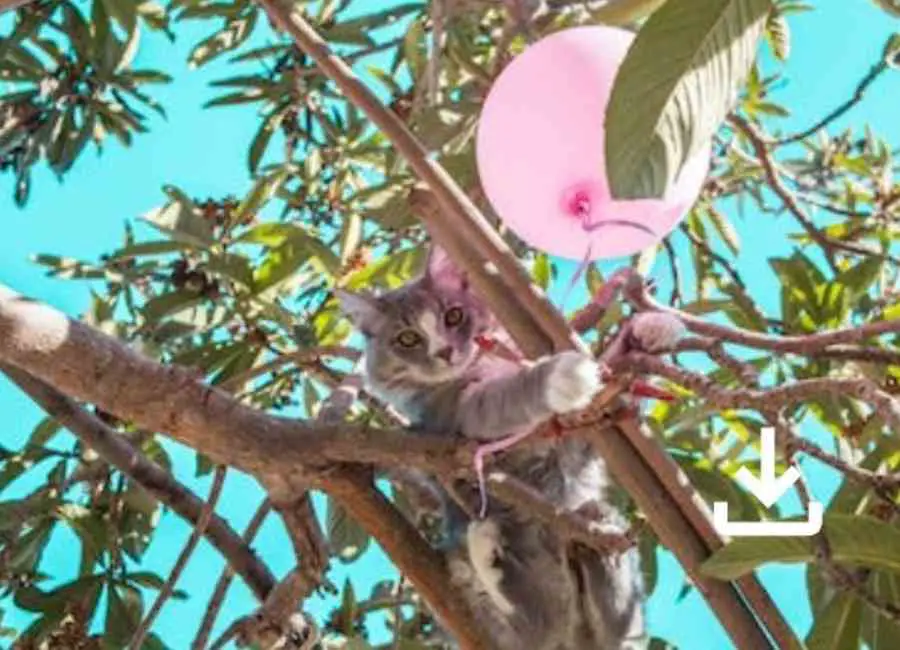10 Reasons Why Cats Are Afraid Of Balloons

Are you wondering why cats are afraid of balloons? You will find some answers here. Keep reading…
We, as cat owners should understand that cats can behave unpredictably and that this behavior toward balloons may be confusing.
In this article, we’ll explore the nine most common reasons why cats are afraid of balloons.
First, let’s start off with a bit of background information: cats have a heightened sense of fear when it comes to objects they don’t understand.
This is why cats are often scared of loud noises, sudden movements, and unfamiliar objects. That’s why they tend to be so scared of balloons!
Why Cats Are Afraid Of Balloons
There are a few reasons why your cat may be afraid of balloons. One reason could be that the balloon reminds your cat of a predator.
Another reason could be that the balloon is loud and makes a sudden movement when popped, which can startle your cat.
If your cat is afraid of balloons, try to keep them out of the house or keep them away from your cat.
Reasons Why Cats Are Afraid Of Balloons
Here are a few reasons why your cat may be afraid of balloons:
- Loud Popping Noise: Cats have excellent hearing and are very sensitive to sound. The loud popping noise made when balloon bursts can be extremely frightening to cats, sending them into a panic.
- Unfamiliarity: Cats like to be in control of their environment and may feel threatened by something they are unfamiliar with. As balloons are often brightly colored, move unpredictably, and can float around the house, cats may feel uncomfortable with them.
- Tactile Sensitivity: Cats have extremely sensitive whiskers and the texture of the balloon may cause discomfort for cats. Additionally, cats may be distressed by the feeling of the air escaping from the balloon when it is deflated.
- Changes in Pressure: Cats are sensitive to changes in pressure, and the sensation of a balloon inflating may be startling to them. This can make them feel uncomfortable and cause them to act defensively.
- Unpredictable Movements: Balloons can be unpredictable in their movements, which can be disorienting for cats. The random movements of a balloon floating around a room can make cats feel unsafe and cause them to flee.
- Prey Instinct: Cats are hunters, and the unpredictability of balloons may trigger their instinct to hunt. This can make the balloon seem like a dangerous predator, causing cats to act defensively.
- Balloons are hard to escape: Because balloons are round and have no edges, cats find them difficult to escape from.
- Fear of Flying Objects: Cats may associate balloons with other flying objects that can harm them, like flying insects, and may be scared of them as a result.
- Balloons are a suffocation hazard: Balloons are made of elastic material, and when cats chew on them, they can become stuck around their heads, leading to suffocation.
- Balloons can be confusing: Cats are naturally curious creatures, and balloons can be confusing for them.
How to make cats not to be afraid of balloons
If your cat is afraid of balloons, there are a few things you can do to help ease its anxiety or depression.
First, try to keep balloons away from your cat when they’re not being used.
If you have a balloon that your cat likes, try to intermittently offer it to them while avoiding sudden movements or loud noises.
You can also try to set up a game where you and your cat chase each other with balloons.
Just be sure to keep a watchful eye in case your cat becomes too excited and starts to chase or leap out at the balloons.
- Give your cat a balloon as a toy.
- Take your cat for a balloon ride.
- Play with your cat with a balloon.
- Always reward your cat for playing with balloons.
- Blow up a balloon and watch your cat get scared.
- Make a scary balloon for your cat and watch its reaction.
- Reward your cat for not running away from balloons.
- Play any cat and balloon movies for your cat.
- Let your cat watch how you play with balloons.
We hope this article has helped shed light on why cats are afraid of balloons.
If your cat exhibits any signs of distress around balloons, such as hiding, panting, or crying.
It is best to remove them from the environment and keep them away from balloons.
